|
|
| |
| EVENTS |
|
|
> PILDAT Launches Assessment of the Quality of Democracy in Pakistan
Let us Judge the Processes and Principles of Democracy through upcoming Election: Syed Naveed Qamar
|
|
|
| |
Islamabad, January 30; Let us judge the processes and principles of democracy, put in place by the coalition Government in 5 years, through the upcoming election, said Syed Naveed Qamar, MNA, Federal Minister for Defence while addressing the Launch Roundtable of PILDAT Report on the Assessment of Quality of Democracy in Pakistan today. |
|
| |
Nominated from the Prime Minister of Pakistan to represent the Government at the Launch Roundtable, Syed Naveed Qamar congratulated PILDAT for what he termed as serving as a watchdog on democracy and said that we are grateful for PILDAT�s independent, non-partisan view on processes and democracy that it has been providing over the years.
|
|
| |
He said that regardless of results of public opinion polls today, the most important test of democracy will be through free and fair election, the biggest and actual poll which will be held in a few months� time. For the first time in Pakistan, democratic governments in the centre and in provinces will be voted in or out based on their performance in office. He said that the ranking of democracy in Pakistan will get a boost there. More than at any time in the history of Pakistan, steps have been taken to put in place electoral reforms to allow for a level-playing field. |
|
| |
Syed Naveed Qamar said that it is an unfair comment that Prime Minister is a figure-head compared to the President. He explained that President, in the current dispensation is drawing his power from party chairpersonship. When ruling coalition would not belong to the same party after Election, this equation will also change. He also said that no President who was committed to a non-political philosophy would have allowed devolution of power from Presidency to the Parliament. He also said that the test of holding power is not just its display as in the shape of guns and tanks but with how much restraint the power has been used � as has been displayed by the PPPP Government in the past 5 years. |
|
| |
He said that let this system and the Election Commission be supported for the conduct of free and fair election. There is no dearth of constitutional and legal powers available to the ECP and its real test will be how effectively ECP uses these powers in the conduct of a fair poll. |
|
| |
Chairing the session, Mr. Shahid Hamid, Senior Advocate Supreme Court, presented the consensus scores of the Democracy Assessment Group. He said that in five (5) years since 2008 while the processes of democracy have improved considerably, the performance of democracy or its product, the democratic governments, has been poor. He mentioned that the Executive Summary of the report carries aggregate scores.
Presenting findings from Gallup-PILDAT Public Opinion Survey conducted to gauge public opinion on quality of democracy in the past 5 years, Dr. Ijaz Shafi Gilani, Chairman Gallup Pakistan, said that Media, Judiciary and Provincial Autonomy have appeared as Gainers; whereas, in the public opinion, Parliament, Respect for Human Rights, Cabinet, Law Observance Executive Proprietary, increased Foreign encroachment on national decision making and Democratic Control over Military are Losers. Prospects of Free and Fair Election reflected through independence of Election Commission of Pakistan have not improved in the past 5 years in the public opinion. |
|
| |
Earlier, presenting the summary of PILDAT analysis, Ms. Aasiya Riaz, Joint Director PILDAT said that strengthening of democratic processes in 5 years has received the score of 44.2% as compared to Performance of Democracy which is rated at a low 20.9% by the Democracy Assessment Group. The aggregate score of all the questions amounted to 37.9%; the over-arching question on �how good is the quality of democracy in the country� received a score of 45%, below even the 10%% mark.
Explaining the scores, she said that Strong pillars of democracy have been evaluated to be Media with a 10%.1% score, strengthening of constitutional framework with 57.7% score, Electoral Process and Management at 58.5% while Weak pillars include Local Government with a score of 21.4%, Public Spending at 21.7% and Service Delivery at 22.5%.
She said that factors contributing positively to the quality of democracy in Pakistan have included smooth transfer of power from one head of Government to another; Parliament of Pakistan beginning to play a role in influencing national security and foreign policy decisions of the country; constitution of a full-time 5-member Election Commission including the Chief Election Commissioner through a bi-partisan process; Judiciary aggressively following the case of missing persons especially in Balochistan and concluding the 17-year old Asghar Khan case, etc. |
|
| |
Factors that have contributed negatively to quality of democracy are analysed by the Group to be lack of initiatives on good governance; State�s declining capacity in containing terrorism and militancy; Parliament�s failure to develop across-the-board political consensus on providing a comprehensive framework dealing with terrorism and accountability; poor performance of economy; failure of Provincial Governments to hold Local Government elections and a partisan President visibly taking the lead in major policy and decision-making functions reducing the Prime Minister to a figurehead.
Highlighting future concerns for democracy, she said that Assertion of Judiciary at the cost of encroaching upon Executive�s domain, lack of effective democratic control on defence and national security, neutrality and integrity of the caretaker Governments, continuation of a highly partisan President and almost equally partisan provincial Governors during the upcoming election and the inability of the ECP in taking timely and effective action on issues impacting upcoming election.
Members of Democracy Assessment Group that joined the Launch Roundtable included Senator Mir Hasil Bizenjo, Senior Vice President, Balochistan National Party; Dr. Ijaz Shafi Gilani, Chairman, Gallup Pakistan; Justice (Retd.) Manzoor Gilani, Former Chief Justice, Azad Jammu and Kashmir; Lt. Gen. (Retd.) Moinuddin Haider, Former Governor, Sindh; former Federal Minister for Interior; Mr. Shahid Hamid, Senior Advocate, Supreme Court; former Governor, Punjab; former Federal Caretaker Minister; Mr. Riaz Khokhar, Former Foreign Secretary; Dr. Hasan-Askari Rizvi, Defence and Political Analyst; Mr. Ghazi Salahuddin, Senior Analyst; Mr. Illahi Bukhsh Soomro, Former Speaker, National Assembly; Senator S. M. Zafar, Senior Advocate, Supreme Court; Constitutional Expert; Mr. Ahmed Bilal Mehboob, President PILDAT and Ms. Aasiya Riaz, Joint Director PILDAT. |
|
| |
Members of Parliament, Political Parties, Business community, youth representatives, media and analysts joined the launch Roundtable and appreciated and supported the conclusions drawn by PILDAT Democracy Assessment Group on the quality of democracy in Pakistan.
Complete PILDAT Report on Assessment of the Quality of Democracy in Pakistan: Year 2012 can be accessed here.
The report has been prepared and published and launch roundtable have been organised by PILDAT under the project Supporting Monitoring of Democracy, Electoral Reforms and Development of Youth in Pakistan which is supported by the Danish International Development Agency (DANIDA), Government of Denmark. The views expressed in the report, or expressed at the roundtable, do not necessarily represent the views of DANIDA, the Government of Denmark and the Royal Danish Embassy Islamabad. |
|
| |
|
|
| |
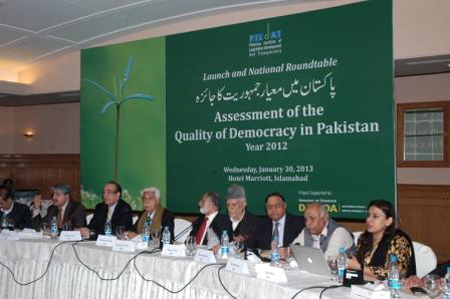
|
|
| |
|
|
| |
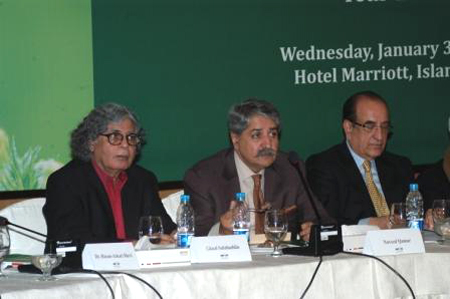
|
|
| |
|
|
| |
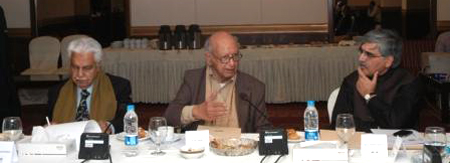
|
|
| |
|
|
| |
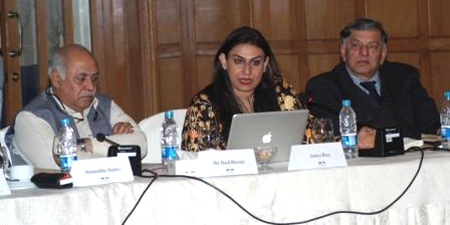
|
|
| |
|
|
| |
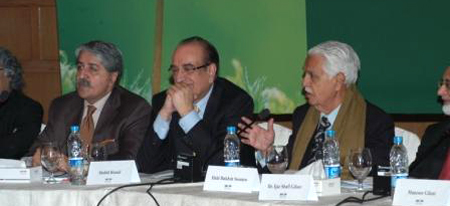
|
|
| |
|
|
| |
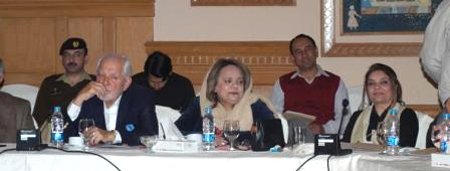
|
|
| |
|
|
| |

|
|
| |
|
|
| |

|
|
|
|
|
|
|
|
|